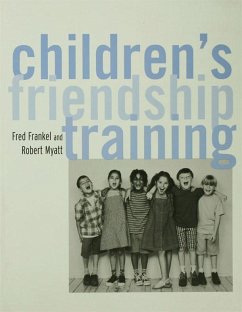42,95 €
42,95 €
inkl. MwSt.
Sofort per Download lieferbar

21 °P sammeln
42,95 €
Als Download kaufen

42,95 €
inkl. MwSt.
Sofort per Download lieferbar

21 °P sammeln
Jetzt verschenken
Alle Infos zum eBook verschenken
42,95 €
inkl. MwSt.
Sofort per Download lieferbar
Alle Infos zum eBook verschenken

21 °P sammeln
- Format: ePub
- Merkliste
- Auf die Merkliste
- Bewerten Bewerten
- Teilen
- Produkt teilen
- Produkterinnerung
- Produkterinnerung

Bitte loggen Sie sich zunächst in Ihr Kundenkonto ein oder registrieren Sie sich bei
bücher.de, um das eBook-Abo tolino select nutzen zu können.
Hier können Sie sich einloggen
Hier können Sie sich einloggen
Sie sind bereits eingeloggt. Klicken Sie auf 2. tolino select Abo, um fortzufahren.

Bitte loggen Sie sich zunächst in Ihr Kundenkonto ein oder registrieren Sie sich bei bücher.de, um das eBook-Abo tolino select nutzen zu können.
First published in 2003. Routledge is an imprint of Taylor & Francis, an informa company.
- Geräte: eReader
- mit Kopierschutz
- eBook Hilfe
- Größe: 5.29MB
First published in 2003. Routledge is an imprint of Taylor & Francis, an informa company.
Dieser Download kann aus rechtlichen Gründen nur mit Rechnungsadresse in A, B, BG, CY, CZ, D, DK, EW, E, FIN, F, GR, HR, H, IRL, I, LT, L, LR, M, NL, PL, P, R, S, SLO, SK ausgeliefert werden.
Produktdetails
- Produktdetails
- Verlag: Taylor & Francis
- Seitenzahl: 210
- Erscheinungstermin: 13. Mai 2013
- Englisch
- ISBN-13: 9781135451516
- Artikelnr.: 38245918
- Verlag: Taylor & Francis
- Seitenzahl: 210
- Erscheinungstermin: 13. Mai 2013
- Englisch
- ISBN-13: 9781135451516
- Artikelnr.: 38245918
- Herstellerkennzeichnung Die Herstellerinformationen sind derzeit nicht verfügbar.
Fred Frankel is Professor of Medical Psychology, UCLA Department of Psychiatry. He developed the UCLA Children's Friendship Training Program with Robert Myatt, offering treatment to over 900 children with friendship problems since 1989. He has published several controlled studies and was awarded an NIMH research grant to study Children's Friendship Training.
Forward
Preface
Purpose and organization of this manual
oA self-contained guide for the clinician
oTraining socially valid behaviors
oMaintaining treatment integrity
oOrganization of this manual
oRelated resources
Section I. BackgroundChapter 1. Reasons to Treat Peer Relationship Problems
Chapter 2. Assessment of Outcomes
Chapter 3. Types of Children's Social Skills Treatment
Chapter 4. Common Diagnoses of Children Obtaining Training
Chapter 5. Research on the UCLA Children's Friendship Program
Section II.Preparing for Treatment
Chapter 6. Screening
Chapter 7. Intake
Chapter 8. Program Infrastructure
Section III. Session ContentChapter 9. Introductory Session/Setting the
Stage
Chapter 10. Conversational Skills
Chapter 11. "Slipping In"/Reputation/Using Community Resources
Chapter 12. Taking "No" for an Answer/Gender and Age Issues
Chapter 13. Rules of a Good Sport/Social Goals
Chapter 14. Rules of a Good Sport/Positive Statements
Chapter 15. Making a Best Friend/Play Dates
Chapter 16. Resisting Teasing
Chapter 17. Respect Towards Adults
Chapter 18. Managing Competition/Gender Differences
Chapter 19. Avoiding Physical Fights
Chapter 20. Graduation
References
Index
Preface
Purpose and organization of this manual
oA self-contained guide for the clinician
oTraining socially valid behaviors
oMaintaining treatment integrity
oOrganization of this manual
oRelated resources
Section I. BackgroundChapter 1. Reasons to Treat Peer Relationship Problems
Chapter 2. Assessment of Outcomes
Chapter 3. Types of Children's Social Skills Treatment
Chapter 4. Common Diagnoses of Children Obtaining Training
Chapter 5. Research on the UCLA Children's Friendship Program
Section II.Preparing for Treatment
Chapter 6. Screening
Chapter 7. Intake
Chapter 8. Program Infrastructure
Section III. Session ContentChapter 9. Introductory Session/Setting the
Stage
Chapter 10. Conversational Skills
Chapter 11. "Slipping In"/Reputation/Using Community Resources
Chapter 12. Taking "No" for an Answer/Gender and Age Issues
Chapter 13. Rules of a Good Sport/Social Goals
Chapter 14. Rules of a Good Sport/Positive Statements
Chapter 15. Making a Best Friend/Play Dates
Chapter 16. Resisting Teasing
Chapter 17. Respect Towards Adults
Chapter 18. Managing Competition/Gender Differences
Chapter 19. Avoiding Physical Fights
Chapter 20. Graduation
References
Index
Forward
Preface
Purpose and organization of this manual
oA self-contained guide for the clinician
oTraining socially valid behaviors
oMaintaining treatment integrity
oOrganization of this manual
oRelated resources
Section I. BackgroundChapter 1. Reasons to Treat Peer Relationship Problems
Chapter 2. Assessment of Outcomes
Chapter 3. Types of Children's Social Skills Treatment
Chapter 4. Common Diagnoses of Children Obtaining Training
Chapter 5. Research on the UCLA Children's Friendship Program
Section II.Preparing for Treatment
Chapter 6. Screening
Chapter 7. Intake
Chapter 8. Program Infrastructure
Section III. Session ContentChapter 9. Introductory Session/Setting the
Stage
Chapter 10. Conversational Skills
Chapter 11. "Slipping In"/Reputation/Using Community Resources
Chapter 12. Taking "No" for an Answer/Gender and Age Issues
Chapter 13. Rules of a Good Sport/Social Goals
Chapter 14. Rules of a Good Sport/Positive Statements
Chapter 15. Making a Best Friend/Play Dates
Chapter 16. Resisting Teasing
Chapter 17. Respect Towards Adults
Chapter 18. Managing Competition/Gender Differences
Chapter 19. Avoiding Physical Fights
Chapter 20. Graduation
References
Index
Preface
Purpose and organization of this manual
oA self-contained guide for the clinician
oTraining socially valid behaviors
oMaintaining treatment integrity
oOrganization of this manual
oRelated resources
Section I. BackgroundChapter 1. Reasons to Treat Peer Relationship Problems
Chapter 2. Assessment of Outcomes
Chapter 3. Types of Children's Social Skills Treatment
Chapter 4. Common Diagnoses of Children Obtaining Training
Chapter 5. Research on the UCLA Children's Friendship Program
Section II.Preparing for Treatment
Chapter 6. Screening
Chapter 7. Intake
Chapter 8. Program Infrastructure
Section III. Session ContentChapter 9. Introductory Session/Setting the
Stage
Chapter 10. Conversational Skills
Chapter 11. "Slipping In"/Reputation/Using Community Resources
Chapter 12. Taking "No" for an Answer/Gender and Age Issues
Chapter 13. Rules of a Good Sport/Social Goals
Chapter 14. Rules of a Good Sport/Positive Statements
Chapter 15. Making a Best Friend/Play Dates
Chapter 16. Resisting Teasing
Chapter 17. Respect Towards Adults
Chapter 18. Managing Competition/Gender Differences
Chapter 19. Avoiding Physical Fights
Chapter 20. Graduation
References
Index
